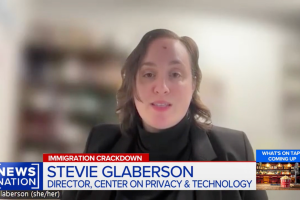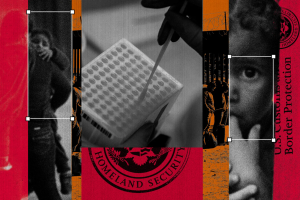Our Work
Founded in 2014, the Center on Privacy & Technology is a leader at the intersection of privacy, surveillance, and civil rights.
Latest Work

Privacy Center quoted in El País article about FOIA lawsuit
Director of Research and Advocacy Stevie Glaberson was quoted in an El País article about the recent lawsuit the Center on Privacy & Technology, Amica Center for Immigrant Rights, and Americans for Immigrant Justice jointly filed against the Department of Homeland Security after trying to get records about DHS' DNA collection program. "The public needs to know now more than ever what the government is doing. There really is no protection. The way DNA is collected is unconstitutional and violates the Fourth Amendment, which protects against search and seizure," said Glaberson. The Center on Privacy & Technology's 2024 report, "Raiding the Genome," was also cited in the article. The article was also published in Spanish.

Privacy Center quoted in Law&Crime article about FOIA lawsuit
Associate Emerald Tse was quoted in a Law&Crime article about the recent lawsuit the Center on Privacy & Technology, Amica Center for Immigrant Rights, and Americans for Immigrant Justice jointly filed against the Department of Homeland Security after trying to get records about DHS' DNA collection program. "We are demanding that DHS disclose agency policies on who they collect DNA from, how to collect samples, and where the samples are being stored. The public has the right to know how taxpayer dollars are being used in government operations, especially those that concern the privacy of our genetic material, and this lawsuit is about vindicating that right," Tse said. Director of Research and Advocacy Stevie Glaberson was also quoted: "Americans deserve visibility on the details of this program, and the department’s lack of transparency is unacceptable."

Privacy Center quoted in The Washington Informer article about FOIA lawsuit
Executive Director Emily Tucker was quoted in a The Washington Informer article about the Center on Privacy & Technology, Amica Center for Immigrant Rights, and Americans for Immigrant Justice's lawsuit against the DHS. "To the contrary, Trump is using immigration powers as the vehicle for the activities of a militarized police force, a weapon he can wield broadly and violently without having to navigate obstacles in the form of transparency, accountability, or oversight," said Tucker. Director of Research and Advocacy Stevie Glaberson was also quoted.

Privacy Center quoted in The Tuscon Sentinel article about FOIA lawsuit
The Tucson Sentinel wrote an article about the Center on Privacy & Technology, Amica Center for Immigrant Rights, and Americans for Immigrant Justice's lawsuit against the DHS. The article also cites the Privacy Center's 2024 report "Raiding the Genome" and quotes Executive Director Emily Tucker, Director of Research & Advocacy Stevie Glaberson, and Associate Emerald Tse.

Privacy Center quoted in NBC News article about FOIA lawsuit
Director of Research and Advocacy Stevie Glaberson, Executive Director Emily Tucker, and Associate Emerald Tse were all quoted in a NBC News article about the recent lawsuit the Center on Privacy & Technology, Amica Center for Immigrant Rights, and Americans for Immigrant Justice jointly filed against the Department of Homeland Security after trying to get records about DHS' DNA collection program. "DHS is doing so despite collecting DNA from people accused of no crime and while operating with none of the constraints that are supposed to be in place before the government compels someone to give over their most sensitive personal information," Glaberson said. “It is a mistake to think of DHS’s DNA collection program as “immigration enforcement,"" said Tucker. "The program reinforces harmful narratives about immigrants and intensifies existing policing practices that target immigrant communities and communities of color, making us all less safe," said Tse.

Privacy Center quoted in Gizmodo article about CBP’s DNA collection program
Director of Research and Advocacy Stevie Glaberson was quoted in a Gizmodo article, "U.S. Immigration Authorities Are Adding Children’s DNA to a Criminal Database" about CBP's DNA collection program. “The revelation that CBP collected DNA from a 4-year-old and added it to CODIS brings the absurdity of the government’s DNA program into sharp relief," said Glaberson. The Center on Privacy & Technology's 2024 report, "Raiding the Genome," was also cited in the article.

Privacy Center quoted in Newsweek article about FOIA lawsuit
Director of Research and Advocacy Stevie Glaberson was quoted in a Newsweek article about the Center on Privacy & Technology, Amica Center for Immigrant Rights, and Americans for Immigrant Justice's lawsuit against the DHS. "We filed this suit in the hopes of chipping away at the obscurity in which the administration is carrying out some of its most dangerous programs. The country deserves to know the details of DHS's DNA collection program," said Glaberson. Executive Director Emily Tucker's press release statement was also quoted.

Privacy Center quoted in The Guardian article about CBP collecting immigrant DNA
The Center on Privacy & Technology's 2024 report, "Raiding the Genome," was cited in a The Guardian article about US immigration authorities' collection of immigrant DNA. Associate Emerald Tse's press release statement was also quoted in the article. "The program reinforces harmful narratives about immigrants and intensifies existing policing practices that target immigrant communities and communities of color, making us all less safe," said Tse.

Privacy Center in NewsNation piece about the DNA collection of immigrants
Director of Research and Advocacy Stevie Glaberson appeared on NewsNation to talk about the DNA collection of immigrants. “When we start talking about DNA, we’re talking about some of the most sensitive information possible, making us really vulnerable. I think what’s important for people to understand is that the risks are not just, even, to the people whose DNA is taken and placed into the system. Very quickly, the risk starts to rebound to all of us," Glaberson said. The video and article were republished in WKRN News 2, WSPA, Fox 8, and KXAN Austin.

Privacy Center quoted in WIRED article about CBP’s DNA collection program
Director of Research and Advocacy Stevie Glaberson was quoted in a WIRED article about CBP's DNA collection program. "Taking DNA from a 4-year old and adding it into CODIS flies in the face of any immigration purpose. That’s not immigration enforcement. That’s genetic surveillance,”said Glaberson. The article also cited the Center on Privacy & Technology's 2024 report "Raiding the Genome."
